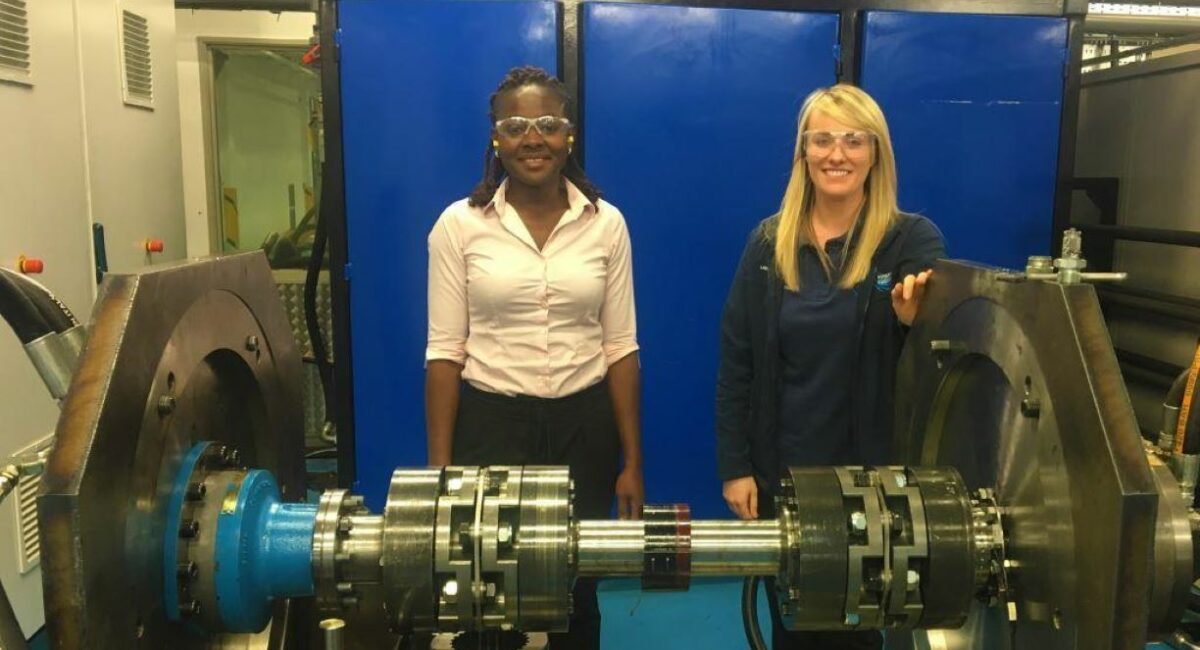Hi Diane and Laura! We know that you’re both Design Engineers at Rotary Power, part of the British Engines Group, but how did you first get into engineering?
Diane: I always knew that I wanted to be an engineer. I wanted to specialise in aerospace because I thought wow, I’d be making planes! I fell into mechanical engineering instead which is great. I’m constantly learning transferable skills that would apply to any area of engineering.
Laura: My degree’s actually in nutrition and the plan was to go on to get my masters in Dietetics. To help fund my future studies I started working at BEL Valves, one of the British Engines Group companies. Firstly I worked in administration and I then went on to be a Production Coordinator.
That’s when I first started to think about becoming an engineer. Why would I want to leave such a good company with great opportunities for progression? When the Trainee Design Engineer position came along I really, really wanted it and I just had to go for it. I didn’t have any engineering qualifications, but I was really lucky that my manager decided to give me a chance. I just wanted it so much.
The British Engines Group is putting me through my HNC at college. I’ll then go on to get my degree as part of my role. They’re really supportive about getting me through my qualifications and I’m really grateful for the opportunity they’ve given me.
Diane: Laura’s a great example of how having passion and determination can get you the career you want.
This year’s International Women in Engineering Day focuses on the theme #RaisingTheBar. How do you raise the bar as women in engineering?
Laura: We raise the bar in everything we do. It’s a great feeling seeing your concept go from a drawing to a reality. Engineering is everything you do and everything that is around you. To see your product come to life is incredibly rewarding. Especially as you know it’s going to contribute to something that could help change and shape the world we live in.
Diane: Engineering is all about designing and creating things that function more effectively. It’s about raising the bar so that we can revolutionise the society we live in. That’s the responsibility of all engineers, not just females in the industry.
How do you encourage other young women around you to pursue a career in engineering?
Diane: I have a heavy involvement in STEM events. When there’s a female present it helps; it encourages other females to come over and learn more about the industry and a career in engineering.
Breaking the stigma and stereotypical view of engineering amongst parents can be difficult. They don’t usually understand what an engineer actually does.
Engineering is like all other professions. Although being good at maths and science is useful, it’s more about putting the time, passion, and effort into studying. You need determination, creativity and the ability to problem solve. Laura’s very good at the creative part!
Laura: A variety of different skills can be utilised in engineering. Not just those typically associated with the profession. It is important to educate young women that engineering is a creative, innovative and exciting career. We need to work to correct the negative view that it’s boring work and a ‘man’s job’.
Do you think engineering is still seen as a man’s industry?
Diana: Yes, when you look around any engineering office there are still so many men in comparison to women. But that can change with continued encouragement in schools and educating people about what being an engineer is really like. Before I became an engineer I didn’t really know what it was like.
Laura: It is still a male dominated industry and yes this can be intimidating. But it’s important to break down the stereotype of what an engineer looks like in order to encourage more women to consider a career in engineering.
Are you ever aware that you’re a woman in engineering? Do you think challenges for women in the industry are inevitable?
Laura: In the office you don’t generally think about the fact that you’re one of only a few women. It’s not something I ever really think about until someone brings it up.
Diane: No, I don’t really think about it either.
Our biggest challenge is breaking the stereotype surrounding women in engineering. You can be an engineer if you want to. It’s not a man’s job.
How do people react outside of work to the fact that you’re an engineer?
Laura: People are always shocked when you tell them you’re an engineer.
Diane: Always. Last Sunday I was at a baby shower and everyone was asking each other what they did. Once I said I was an engineer the whole table turned around and focussed on me. They were asking questions and saying how interesting it was. People always say things like ‘wow you must be really intelligent’ and I’m like ‘nope’!
What more can be done to encourage females to work in engineering?
Diane: I think engineering companies just need to continue building relationships with schools. I think we need to educate students, teachers and parents about the different things you can do within the industry like sales, purchasing and finance.
Laura: You don’t realise there are different areas until you’re told about them. We need to educate people about the different roles that are available depending on your skills and how you want to progress your career.
And finally, can you give us three words that describe what the best thing about being an engineer is?
Laura: Solving challenging problems
Diane: Continuous learning process
If you’re interested in learning more about a career with the British Engines Group, head to our jobs page.
